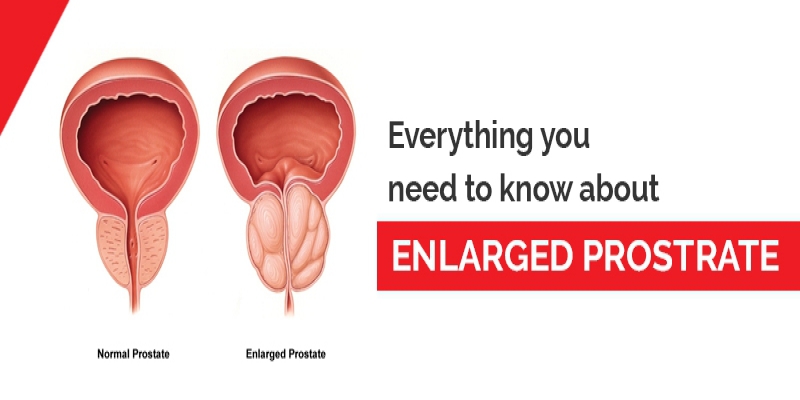Everything You need to know About Enlarged Prostate (BPH)
2019-05-17 / RG STONE HOSPITAL / Enlarged Prostate (BPH)

About Prostate Gland :
Prostate gland is a walnut shaped male gland that produces the prostatic fluid that carries sperms during ejaculation. It surrounds the urethra, which is the tube that passes urine and semen out of the body.
What is Enlarged Prostate ?
The condition of enlarged prostate means that the gland has grown larger. This happens to most men as they grow older especially above the age of 50. The other name for enlarged prostate is benign prostatic hyperplasia (BPH) or benign prostatic enlargement (BPE).
Causes of Enlarged Prostate :
It is not exactly known what causes an enlarged prostate. Natural aging and changes in the cells of the testicles might be the factors that contribute to the enlargement of the prostate gland. It has been observed that men who have had their testicles removed due to testicular cancer at a young age, do not develop an enlarged prostate.
Some factors that may lead to enlarged prostate are:
- Age : The risk of having an enlarged prostate grows as you grow older. Men above 50 have an enlarged prostate but they do not always have symptoms. Also, sometimes the symptoms might not be bothersome.
- Hormone Levels : The balance of the two hormones, testosterone and estrogen changes as your body ages. This can cause your prostrate to increase in size.
- Other Factors : Some studies have shown that men with high blood sugar are more likely to get an enlarged prostate. Some research also suggests that it is hereditary but this is yet to be confirmed.
Signs and Symptoms of an Enlarged Prostate :
An enlarged prostate most commonly causes urinary problems in men aged over 50. The most likely symptoms include:
- Weak flow during urination
- A sensation that the bladder has not emptied properly
- Difficulty in starting to urinate
- Dribbling of urine after you have finished urinating
- The urge to urinate more often, especially during nighttime
- Sudden need to urinate – you may leak before you can get to the washroom
It is not compulsory that you will get all these symptoms. Sometimes men do not get any symptoms at all. Other factors might lead to similar symptoms like anxiety, cold weather, lifestyle factors, other health problems, and other medications.
Blood in the urine is also a symptom of enlarged prostate but it is a rare one. You need to contact your doctor if you notice any of these symptoms.
Risk of Prostate Cancer :
Enlarged prostate merely means an increase in the size of the prostate gland. It does not increase your risk of prostate cancer. The two problems usually start in different sections of the prostate gland. However, it is possible to have enlarged prostate and prostate cancer at the same time.
Effect of Enlarged Prostate :
An enlarged prostate affects different men in different ways. Some men experience mild symptoms and do not require treatment. Other men have to be near a washroom at all times which can make it difficult to work, travel or socialize. Frequent need to urinate during the night can affect sleep and make you more tired during daytime.
Diagnosis for Enlarged Prostate :
Your doctor will diagnose enlarged prostate based on:
- Personal and family medical history
- Physical examination
- Medical Tests
Treatment for Enlarged Prostate :
If you have been diagnosed with an enlarged prostate, the treatment options are as follows:
- Changes in lifestyle
- Medication
- Some minimally invasive medical procedures
- Surgery
The treatment will depend on the severity of the symptoms, the extent to which the symptoms are affecting your daily life, and your personal preferences.
You may not need treatment if the prostate is mildly enlarged unless your symptoms are affecting the quality of your life. For mild symptoms, a urologist will ask you to get regular medical checkups done. For severe symptoms, you can opt for treatment.
Conclusion :
An enlarged prostate is a treatable condition and if you have any of the symptoms, please contact your doctor for medical advice and treatment if required.
By RG Hospital
Read more About : Enlarged Prostate (BPH)
Consult Enlargesd Prostate (BPH) Specialist
Categories
Hernia Repair
Appendicitis
Piles
Urological Treatment
Hernia treatment
Enlarged Prostate (BPH)
Gall Bladder Stone
Urinary / Kidney Stone
Vitamins
Indian Health Care System
Exercise
Obesity
Female Urinary Incontinence
Single Incision Laparoscopic Surgery (SILS)
Kidney Cancer
Bladder Cancer
Ovarian cancer
Nephrology
Bariatric Surgery
Kidney Function Test
Female Urology
Radiation Therapy
Alcoholic Fatty Liver
Liver disease
Gastroenterology
Kidney Disease
Nutrition & Health
Lung Cancer

